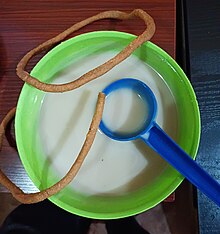


Koko (also OgiinYoruba) is a spicy millet porridge. It is a popular Nigerian and Ghanaian street food and commonly consumed as a breakfast meal. It can also be taken in late afternoon as snack.[1][2] Koko is made from many grains including millet with a few local spices added to give it a particular taste and color.[3] It is called Hausa koko in areas where it was introduced by Hausa-speaking people. In northern Ghana, the term 'Hausa koko' is not used. Instead, porridge made from millet is called 'za koko' in Dagbanli.[4] Several types of porridge are made from corn, millet, and sorghum. Other types of porridge include koko talli/salli, zimbuli, among others.[4] It is also common in the various communities in both countries.[2]
It is usually accompanied by a fried bean bun called Koose, Pinkaso, a spicy fried flour dumpling, kuli-kulior the Nigerian bean cake called Akara, which the former is created from .[5]

Hausa koko is mostly found in West African countries and is credited to the several ethnic groups, it is believed to have been first made by various peoples among whom millet is a dietary staple. It is a common Ghanaian street food. On most mornings, it is sold on street corners.[6] Sugar, milk and groundnuts are sometimes added to give it a very delicious taste.[7]

Koko is made from millet which contains Magnesium, Manganese, Tryptophan, Calcium, Fibre and Vitamin B.[2]
This Ghanaian cuisine–related article is a stub. You can help Wikipedia by expanding it. |